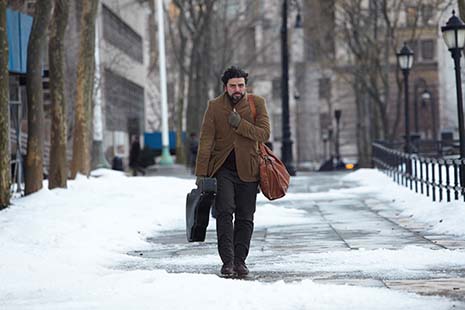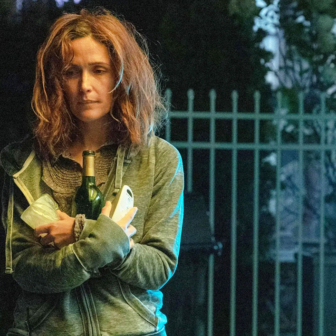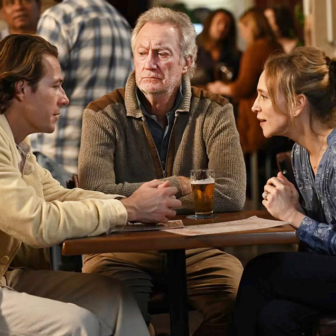LARGE claims have been made for Martin Scorsese’s The Wolf of Wall Street, one London critic believing that here the director attains the level of Shakespearean tragedy. Take a breath, rewind; think back to this director’s Goodfellas (1990); there if anywhere the accolade had merit, with a film of balletic classicism, a great range of characters, and a drama in which at least one woman (Lorraine Bracco’s Karen) is assigned agency, memory, motive and presence. Such is not the case with the present work, which assaults the rise and rise of Jordan Belfort (Leonardo DiCaprio) with undoubted Scorsesean energy. His two wives (Cristin Milioti’s Teresa, Margot Robbie’s Naomi) are little more than trophies. Even in the hands of DiCaprio, Belfort is no more than his appetites: for money, power, sex and cocaine. Working from the real-life Belfort’s memoir, Terence Winter’s script has sharp-edged moments; some of the best come when Mark Hanna (Matthew McConaughey) delivers mentoring advice to the young Jordan: never forget that nobody, but nobody, knows where the stockmarket’s going to go, up, down or sideways; never forget that your business is to move the money into your own pocket, and the best interests of the investors you’re phoning and harassing come last.
There’s a lot of coke-sniffing, and as for sex, the simulated bonking is as uncommunicative as it generally is. When Belfort becomes abject, Naomi’s sexual taunting is very nasty stuff, pointlessly so. The cavorting in the trading room takes in games of humiliation, with a girl accepting $10,000 to have her head shaved in public, trained dwarves being thrown violently against targets, and a discussion among the young brokers about how far those victims can be regarded as human. Having learned quickly, DiCaprio’s Belfort rants and raves, trying to get his troops to go after the great whale, the American myth, so that each can become, as he says, “Captain fucking Ahab”; but while he knows his Melville, they don’t know what he’s talking about; he’s hauled them up from the bottom of the urban heap, but not into a domain where success has anything to do with reading books.
Hollywood’s attention to dramas of money and power goes back a very long way, at least to 1925 and Erich von Stroheim’s Greed. The threads go through the 1930s, the Depression and Frank Capra’s comedies; and along the way there is, inescapably, Citizen Kane. That great fable can be felt haunting the Wolf’s domains, with salutes and echoes like the dancing girls, the lion and the monkey. This whole exercise calls up, irresistibly, one of the great lines in Kane, as spoken slowly by Everett Sloane as Bernstein: “There’s no trick to making a lot of money – if all you want is to make a lot of money.” That being so, The Wolf of Wall Street could have been more interesting than it is. Sometimes – when the billion-dollar yacht is getting swamped in a Mediterranean ocean storm, in the screaming fight with Naomi over the kids, and when Belfort’s writhing around on the ground after an overdose – life threatens to break in on make-believe. In the storm sequence, I thought: we’re going to get the judgement of the gods; but no way – the gods are missing in action. The FBI finally invades the huge raucous trading room; what took them so long?
Kyle Chandler’s agent Patrick Denham, recurrently seen peering narrowly into Belfort’s affairs, is one of the film’s few really enjoyable performances; another comes from Joanna Lumley’s cameo as the rich English aunt. Jean Dujardin (The Artist), as a highly sophisticated Swiss banker, is sheer pleasure to watch; he lights the screen. Jonah Hill, as Belfort’s principal protégé and sidekick, gives the film’s funniest moments – and there are quite a lot of laughs, all at the Wolf’s expense.
The finale is a kind of reprise; many will be taken back to the end of Goodfellas, with Henry Hill, on witness protection, coming out to pick up the morning milk. In the context, the banality was devastating; all he knows, looking back to the days of criminal mayhem, is that that was life, and this is not. We find Belfort, much diminished, still trying to do what he knows to do, and this is neither Shakespearean nor tragedy; those terms require a sense of loss, of the might-have-been, and there’s not enough to Jordan Belfort for that. The work is closer to Fellini than to Shakespeare, Fellini in the mode of La Dolce Vita: an extravagant, sprawling charade, too far inside its own targets, barren and empty at the heart.
THE Coen brothers’ Inside Llewyn Davis, a very good film indeed, can be taken as an odd kind of answer to The Wolf. This is a film about a man who owns nothing much except a good-but-not-great singing voice and a serviceable guitar, with fast-diminishing cred for couch-surfing and cash loans with old friends and lovers. His main disadvantage, however, is that he deals in folk just a bit early for the revival; this is 1961, and Bob Dylan’s star has still to rise – he is glimpsed, and briefly heard, at the end. Llewyn (Oscar Isaac) has lost his musical partner, Mike, to whom we catch conversational references as someone distinctly missing. It becomes clear well into the story, when Llewyn tells a stranger, John Goodman’s deeply inured jazzman Roland Turner, that Mike had jumped off the George Washington Bridge. Turner responds that nobody does that; if you’re serious, you jump off the Brooklyn Bridge.
Llewyn has a sister Joy (Jeanine Seralles) who, because she’s perfectly sensible, won’t give him much house-room, while their geriatric father sits speechless in an old folks’ home. He also has an ex to fight with, Jean; she, in the hands of Carey Mulligan, deals out unsparing punishment and judges him a longtime loser. Her new partner in music and life is Jim (Justin Timberlake), who writes, sings and provides the necessarily sane contrast to Llewyn’s apparently incurable self-absorption and gloom. Out in the Midwest, Llewyn tries out a song with the club-owner Bud Grossman (F. Murray Abraham); a terrific song, the ballad of Queen Jane, who died in giving birth. As with the other songs through the film, this one is played and sung, superbly, right through. Grossman sits impassively; then, after a second’s beat at the end, says quietly, “I don’t see any money in it.”
That exchange takes place in an empty clubhouse, a desolate, crowded perspective with empty chairs stacked upside down on the tables. All the film’s settings are eloquent, like the smokefilled club and the rubbish-littered laneway outside it where, for no obvious reason, Llewyn gets mercilessly beaten up at the film’s beginning and its end. In between, his struggling comings and goings are accompanied often by the story’s most engaging character, a marmalade tabby cat who keeps on turning up, escaping through half-open windows, along corridors, in trains and on streets. His owners, respectable academics called Mitch and Lillian, forgive Llewyn his occasional very bad behaviour; and it becomes oddly apparent that they need him much more than he, occasionally, needs their spare bed.
Llewyn’s sadness isn’t only to do with the loss of Mike, the impossibility of putting things together with Jean; it has to do also with his failure – once, perhaps twice – to be a father. From the first moments of the film, as he sends “Hang me, oh hang me” resounding into the shadowy reaches of the club, Isaac’s performance is orchestrated with the music and the story’s visibly dark, wintry elements – they say New York was freezing that winter. It also has to do with what surrounds and penetrates one particular life; it’s about America, its desperate individualism, the compulsive success–failure psychosis. It is also about America in the time named: the verge of the space age, the depth of the Cold War, the looming-up of Vietnam; the audience is asked to look back through the intervening decades. The fog in the cafe, the menace in the laneway, leave us with everything still to think about. The best films are like that; in the consciousness of the audience, they go on working.
All the more so when, as in this case, we can soon pick up the soundtrack; and all the more so again, as we remember Pete Seeger, who led the way from a long time back. With each of the Coens’ films, the literal story pulls its undertow of myth; the links between the songs and the journey are profound. Llewyn is on the road, driving into the dark and whirling snow; he’s trekking the icy streets; this is an odyssey, in which all arrivals are temporary, all meetings about paths that briefly cross, and the best company is the cat – whose name, as we don’t find out until near the end, is Ulysses.
Oscar Isaac is an actor of enormous range; some commentary on this film described him as “up and coming.” Not for some Australian audiences; we saw him five years ago in Robert Connolly’s remarkable, much-underrated Balibo, as the young José Ramos-Horta: a very complex performance, with a sense of much held in reserve. Robert Connolly had seen Isaac’s showreel, and travelled a long way to engage him. He said that Isaac “was wonderful to work with,” bringing to bear “a rigorous methodology and a fierce intellect” and quite prepared to travel to East Timor for the sake of a demanding role in a comparatively small film. But we didn’t know then that he could sing.
WITH apologies for the delay, I will soon discuss Paolo Sorrentino’s The Great Beauty. Without apologies, I will also comment on Utopia, John Pilger’s most recent essay on his home country, currently in wide non-theatrical circulation. •





